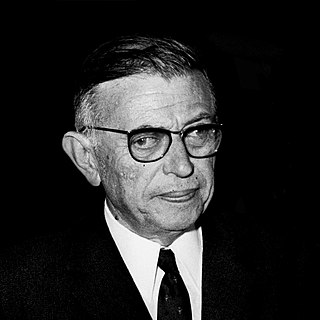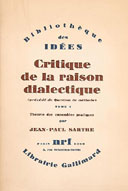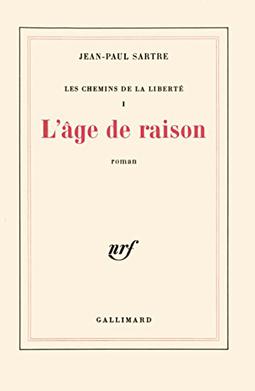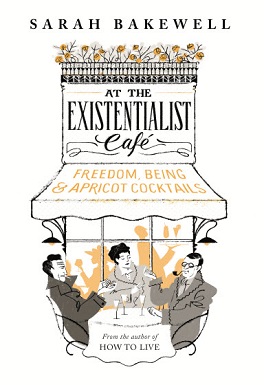
Existentialism is a family of views and forms of philosophical inquiry that explore the existence of the human individual and conclude that, despite the absurdity or incomprehensibility of the universe, individuals must still embrace responsibility for their actions and strive to lead authentic lives. In examining meaning, purpose, and value, existentialist thought often includes concepts such as existential crises, angst, courage, and freedom.

Jean-Paul Charles Aymard Sartre was a French philosopher, playwright, novelist, screenwriter, political activist, biographer, and literary critic, considered a leading figure in 20th-century French philosophy and Marxism. Sartre was one of the key figures in the philosophy of existentialism. His work has influenced sociology, critical theory, post-colonial theory, and literary studies. He was awarded the 1964 Nobel Prize in Literature despite attempting to refuse it, saying that he always declined official honors and that "a writer should not allow himself to be turned into an institution."

Existentialism Is a Humanism is a 1946 work by the philosopher Jean-Paul Sartre, based on a lecture by the same name he gave at Club Maintenant in Paris, on 29 October 1945. In early translations, Existentialism and Humanism was the title used in the United Kingdom; the work was originally published in the United States as Existentialism, and a later translation employs the original title.

Critique of Dialectical Reason is a 1960 book by the philosopher Jean-Paul Sartre, in which the author further develops the existentialist Marxism he first expounded in his essay Search for a Method (1957). Critique of Dialectical Reason and Search for a Method were written as a common manuscript, with Sartre intending the former to logically precede the latter. Critique of Dialectical Reason was Sartre's second large-scale philosophical treatise, Being and Nothingness (1943) having been the first. The book has been seen by some as an abandonment of Sartre's original existentialism, while others have seen it as a continuation and elaboration of his earlier work. It was translated into English by Alan Sheridan-Smith.

Authenticity is a concept of personality in the fields of psychology, existential psychotherapy, existentialist philosophy, and aesthetics. In existentialism, authenticity is the degree to which a person's actions are congruent with their values and desires, despite external pressures to social conformity. The conscious self comes to terms with the condition of Geworfenheit, of having been thrown into an absurd world not of their own making, thereby encountering external forces and influences different from and other than the Self. A person’s lack of authenticity is considered bad faith in dealing with other people and with one's self; thus, authenticity is in the instruction of the Oracle of Delphi: “Know thyself.” Concerning authenticity in art, the philosophers Jean Paul Sartre and Theodor Adorno held opposing views and opinions about jazz, a genre of American music; Sartre said that jazz is authentic and Adorno said that jazz is inauthentic. Many musical subcultures require artistic authenticity, lest the community consider an artist to be a poseur for lacking authenticity ; artistic authenticity is integral to many genres of music, including but not limited to genres of rock, club music, and hip-hop.

Gabriel Honoré Marcel was a French philosopher, playwright, music critic and leading Christian existentialist. The author of over a dozen books and at least thirty plays, Marcel's work focused on the modern individual's struggle in a technologically dehumanizing society. Though often regarded as the first French existentialist, he dissociated himself from figures such as Jean-Paul Sartre, preferring the term philosophy of existence or neo-Socrateanism to define his own thought. The Mystery of Being is a well-known two-volume work authored by Marcel.
Being-in-itself is the self-contained and fully realized being of objects. It is a term used in early 20th century continental philosophy, especially in the works of Martin Heidegger, Jean-Paul Sartre, Simone de Beauvoir, and the existentialists.

The Sickness unto Death is a book written by Danish philosopher Søren Kierkegaard in 1849 under the pseudonym Anti-Climacus. A work of Christian existentialism, the book is about Kierkegaard's concept of despair, which he equates with the Christian concept of sin, which he terms "the sin of despair". Walter Lowrie wrote that he saw the themes in The Sickness unto Death as a repetition of those in Kierkegaard’s earlier work, Fear and Trembling, and as being even more closely related to those in The Concept of Anxiety. suggests he is "an extraordinary Christian".
Existential phenomenology encompasses a wide range of thinkers who take up the view that philosophy must begin from experience like phenomenology, but argues for the temporality of personal existence as the framework for analysis of the human condition.

Nausea is a philosophical novel by the existentialist philosopher Jean-Paul Sartre, published in 1938. It is Sartre's first novel.

The Age of Reason is a 1945 novel by the philosopher Jean-Paul Sartre. It is the first part of the trilogy The Roads to Freedom.

Delusion and Dream in Jensen's Gradiva is an essay written in 1907 by Sigmund Freud that subjects the novel Gradiva by Wilhelm Jensen, and especially its protagonist, to psychoanalysis.
Feminism is a collection of movements aimed at defining, establishing, and defending equal political, economic, and social rights for women. Existentialism is a philosophical and cultural movement which holds that the starting point of philosophical thinking must be the individual and the experiences of the individual, that moral thinking and scientific thinking together are not sufficient for understanding all of human existence, and, therefore, that a further set of categories, governed by the norm of authenticity, is necessary to understand human existence. This philosophy analyzes relationships between the individual and things, or other human beings, and how they limit or condition choice.
The proposition that existence precedes essence is a central claim of existentialism, which reverses the traditional philosophical view that the essence of a thing is more fundamental and immutable than its existence. To existentialists, human beings—through their consciousness—create their own values and determine a meaning for their life because the human being does not possess any inherent identity or value. That identity or value must be created by the individual. By posing the acts that constitute them, they make their existence more significant.
Ivan Soll is an American philosopher who is a Professor Emeritus in the Department of Philosophy at the University of Wisconsin–Madison in the United States. He taught at UW from 1965 until his retirement in May 2011. His teaching and research focused on the philosophy of Friedrich Nietzsche, German philosophy in general, existentialism, aesthetics, and various figures of continental philosophy.
Atheistic existentialism is a kind of existentialism which strongly diverged from the Christian existential works of Søren Kierkegaard and developed within the context of an atheistic world view. The philosophies of Søren Kierkegaard and Friedrich Nietzsche provided existentialism's theoretical foundation in the 19th century, although their differing views on religion proved essential to the development of alternate types of existentialism. Atheistic existentialism was formally recognized after the 1943 publication of Being and Nothingness by Jean-Paul Sartre and Sartre later explicitly alluded to it in Existentialism is a Humanism in 1946.

Gary Cox is a British philosopher and biographer and the author of several books on Jean-Paul Sartre, existentialism, general philosophy, ethics and philosophy of sport.

Sartre: Romantic Rationalist is a book by Iris Murdoch. Published in 1953 by Bowes & Bowes of Cambridge, it was Murdoch's first book and the first book about Jean-Paul Sartre's work to be published in English.

At the Existentialist Café: Freedom, Being, and Apricot Cocktails is a 2016 book written by Sarah Bakewell that covers the philosophy and history of the 20th century movement existentialism. The book provides an account of the modern day existentialists who came into their own before and during the Second World War. The book discusses the ideas of the phenomenologist Edmund Husserl, and how his teaching influenced the rise of existentialism through the likes of Martin Heidegger, Jean Paul Sartre, Simone De Beauvoir, who are the main protagonists of the book. The title refers to an incident in which Sartre's close friend and fellow philosopher Raymond Aron startled him when they were in a cafe, by pointing to the glass in front of him and stating, "You can make a philosophy out of this cocktail."

The 1964 Nobel Prize in Literature was awarded the French writer Jean-Paul Sartre (1905–1980) "for his work which, rich in ideas and filled with the spirit of freedom and the quest for truth, has exerted a far-reaching influence on our age".













